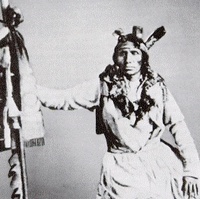
Little Crow
Actor
Little Crow (Dakota: Thaóyate Dúta; ca. 1810 – July 3, 1863) was a chief of the Mdewakanton Dakota people. His given name translates as "His Red Nation," (Thaóyate Dúta) but he was known as Little Crow because of his grandfather's name, Čhetáŋ Wakhúwa Máni, (literally, "Hawk that chases/hunts walking") which was mistranslated. Little Crow is notable for his role in the negotiation of the Treaties of Traverse des Sioux and Mendota of 1851, in which he agreed to the movement of his band of the Dakota to a reservation near the Minnesota River in exchange for goods and certain other rights. However, the government reneged on its promises to provide food and annuities to the tribe, and Little Crow was forced to support the decision of a Dakota war council in 1862 to pursue war to drive out the whites from Minnesota. Little Crow participated in the Dakota War of 1862, but retreated in September 1862 before the war's conclusion in December 1862. A contemporary description of him when he was in his forties was as follows "The chief is a man of some forty five years of age and of a very determined and ambitious nature, but withal exceedingly gentle and dignified in his deportment. His face is full of intelligence when he is in conversation and his whole bearing is that of a gentleman." Little Crow was shot and killed on July 3, 1863 by a settler.
Little Crow (Dakota: Thaóyate Dúta; ca. 1810 – July 3, 1863) was a chief of the Mdewakanton Dakota people. His given name translates as "His Red Nation," (Thaóyate Dúta) but he was known as Little Crow because of his grandfather's name, Čhetáŋ Wakhúwa Máni, (literally, "Hawk that chases/hunts walking") which was mistranslated.
Little Crow is notable for his role in the negotiation of the Treaties of Traverse des Sioux and Mendota of 1851, in which he agreed to the movement of his band of the Dakota to a reservation near the Minnesota River in exchange for goods and certain other rights. However, the government reneged on its promises to provide food and annuities to the tribe, and Little Crow was forced to support the decision of a Dakota war council in 1862 to pursue war to drive out the whites from Minnesota. Little Crow participated in the Dakota War of 1862, but retreated in September 1862 before the war's conclusion in December 1862.
A contemporary description of him when he was in his forties was as follows "The chief is a man of some forty five years of age and of a very determined and ambitious nature, but withal exceedingly gentle and dignified in his deportment. His face is full of intelligence when he is in conversation and his whole bearing is that of a gentleman." Little Crow was shot and killed on July 3, 1863 by a settler.
Little Crow Movies & TV Shows - Watch Online
